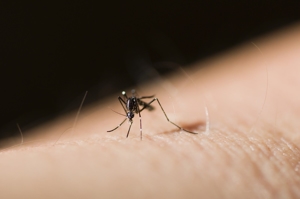
6 Reasons Mosquitoes Bite Some People More Than Others
Summer is the perfect time of year — even as an adult, you can’t help but feel a certain excitement as the season changes. BBQs, summer vacation, camping trips: endless possibilities!
But one certainty of summer is an annoying pest: the mosquito. Mosquito bites itch and can carry disease, which is more than enough reason to avoid them at all costs. But are there foolproof ways to avoid being bitten by a mosquito?
Why do mosquitoes bite me more?
There are many factors that can attract mosquitoes to you more often than friends or even close family members. Many of these factors are genetic and can’t be changed, but some can be regulated by clothing choices and alcohol consumption.
- Metabolism and Physical Activity
A plausible theory for getting bitten more than others could be the amount of time spent outdoors. If you exercise outside, whether for a sport or for pleasure, you could actually be more of a beacon to mosquitoes. - Many genetic factors influence how mosquitoes view us, but movement and heightened body temperatures are major attractors. When you work out, your body creates and releases a wide range of chemicals, including ammonia, lactic acid, and uric acid. These chemicals and your body odor can make you more ‘visible’ to mosquitoes in search of their next meal.2. Skin Bacteria
Whether we know it or not, we play host to millions of bacteria every single day. And that bacteria serves an important role to mosquitoes. A study from 2011 discovered that skin with larger amounts of bacteria was more attractive to mosquitoes. This could explain why mosquitoes bite areas like our feet and ankles — areas commonly ripe with bacteria. - Carbon Dioxide
It may seem like mosquitoes have your number during the summer — and as it turns out, that could be true! Mosquitoes are attracted to carbon dioxide — the colorless, odorless gas we expel when we exhale. Mosquitoes can even detect carbon monoxide from over 150 feet away!
What does this mean? The more carbon dioxide you exhale, the more attractive you are to the little bloodsuckers. This is a big reason that adults are typically bitten more often than children, and those working out (and breathing heavily) are more attractive to mosquitoes than sedentary individuals. - Blood Type
What’s your type? For mosquitoes, Type O blood could be more attractive than other blood types. This is likely due to the fact that mosquitoes rely on certain proteins only found in specific kinds of blood for survival.One study found that mosquitoes in a controlled setting bit people with Type O blood almost two times as much as they bit individuals with Type A blood. But how do mosquitoes know who has what kind of blood? As it turns out, we may release chemicals telling them. Another study found that about 85% of people release a chemical that signals blood types. That leaves only 15% of the population who doesn’t send this signal to mosquitoes. Unsurprisingly, mosquitoes are more attracted to the 85% than they are to the 15%. - Pregnancy
You’ve heard of the pregnancy glow, but how many people know that people aren’t the only ones who find reproduction alluring? There are a few factors that affect a mosquito’s attraction to a pregnant parent:– Pregnant people exhale more carbon dioxide than non-pregnant individuals — almost 21% more!
– Pregnancy causes the body to work harder, meaning pregnant parents run up to two degrees warmer than the average person.
These signs lead to mosquitoes being more attracted to pregnant parents — and proving it by biting them almost twice as often! - Clothing Color
It may seem crazy, but mosquitoes don’t only rely on genetic markers and signals to find their next meal. Mosquitoes have limited eyesight that recognized darker colors more easily than light colors. Avoid wearing black, navy, and red to decrease your chances of getting bitten.
No one can change what you’re made of, but Hopper Termite & Pest can help you remove mosquitoes from your home or property. Contact our team of pest professionals online or by phone at (870)425-4122 today!
